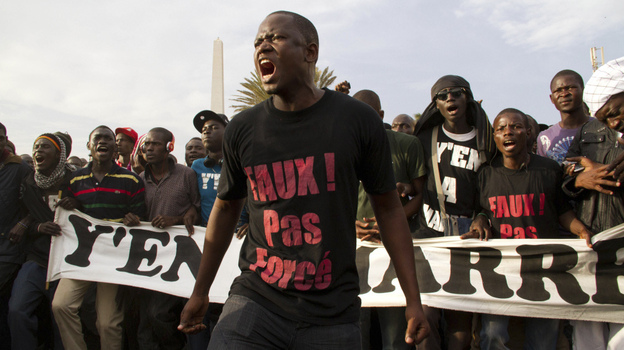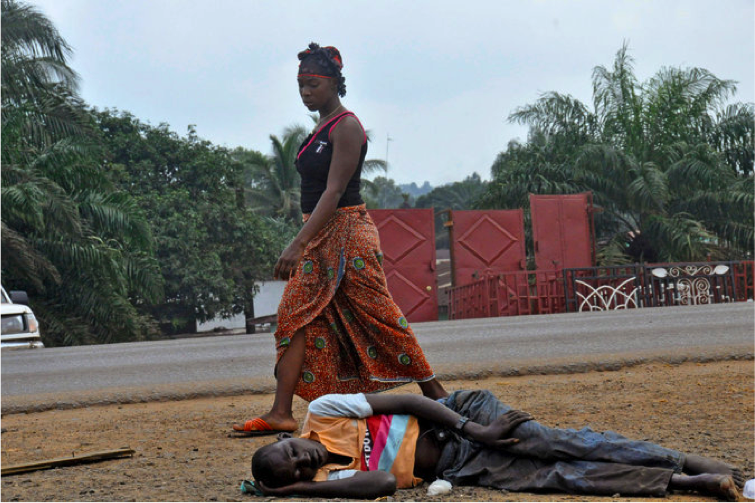Renowned across Africa as a model of democracy with a 40-year history of peaceful transfers of government, this tradition seemed to be under threat during the March elections when incumbent President Abdoulaye Wade, 85, ran for an unprecedented third term. Mr Wade, president since 2000, attempted to subvert the Constitution by claiming that since new amendments had come online in 2007, his first term did not count towards the total. In January, Senegal’s highest court backed the decision to extend his term in office, sparking widespread protests.[captionpix align=”right” theme=”elegant” width=”320″ imgsrc=”http://natoassociation.ca/wp-content/uploads/2012/12/ya-en-marre.jpg” captiontext=”Members of the youth movement ‘Y’En a Marre’ (Enough is enough) take to the streets to protest President Wade’s subversion of democracy in the West African nation.
Photo: Agence de presse sénégalaise.”]
Initially very popular with the country’s youth, over the course of the last several years Mr Wade came under fire for promoting his son, Karim Wade to various posts in the government which many perceived as a bid to install a successor. A $27million statue of Mr Wade in Dakar’s downtown, a new presidential plane, rolling power outages and 54% of the population living below the poverty line did not help Wade’s cause either.
In 2001, President Wade had amended the Constitution to impose a two term limit on the presidency before reducing the length of one term from seven down to five years in 2007. A further amendment in June 2011 to lower the number of necessary votes from 50 to 25 percent to win the presidency was blocked when thousands of youths took to the streets of Dakar, Senegal’s capital, in protest.
Y’En A Marre (Enough is enough)
The street protests against the court decision raised the profile of youth groups who played a crucial role in overcoming President Wade’s attempt to hold on to power. With a median age of just 18 years old, Senegal is an impossibly young country. Unemployment stands at roughly 48% and as 100,000 new job seekers enter the market every year opportunities for the young are bleak.
In Senegal, the only state in West Africa with no experience of a successful coup d’état, peaceful transitions of power are nothing new. Leopold Senghor, Senegal’s first president post-independence from France in 1960 and credited with founding the black consciousness movement also became the first president in Africa to voluntarily hand over power to his successor Abdou Diouf in 1981.
However, recently a growing feeling of marginalisation spurred on by social inequalities and youth discontent called for a new method of engaging with older political elites. Taking a leading role in these protests was a grassroots social movement known as Y’en a Marre or Enough is Enough, formed in early 2011 by young journalists and rappers as a tool to voice the grievances many young people held with the government.
Its ranks swelled leading up to the first round of voting held in February when Mr Wade took 34% of the vote to Mr Sall’s 26%. The group used politicised music such as their election anthem, ‘Abdoulaye Faux! Pas Force’ (Abdoulaye [Wade] is wrong, don’t force it), to spread their message during protest rallies and late last year released a compilation CD. They also espoused the views and frustrations of what they referred to as a New Type of Senegalese (NTS) who advocated free and fair elections in the hope that they would bring social change under a new and more youthful leader.[captionpix align=”left” theme=”elegant” width=”320″ imgsrc=”http://ikulublog.com/wp-content/uploads/2012/04/MACKY-SALL.jpg” captiontext=”New president, Macky Sall.”]
Members of the group also issued a petition called “The one thousand complaints against the state” which quickly received hundreds of signatures. However as the group surged in popularity, the state security apparatus attempted to shut it down by offering some leaders money to leave the country and intimidating others through force and beatings.
Managing to survive, the Y’en a Marre movement was quick to follow the lead of youth groups in Egypt and Tunisia who had successfully used social media sites such as Twitter and Facebook to mobilise opposition and protest rallies during the ‘Arab Spring’ revolts rocking the Middle East. Although not aligned with any of the candidates contesting the election they later threw their support behind the future winner, Mr Macky Sall, 50, a former Wade protégé and prime minister, who had fallen out with Wade over his son’s irregular expenditures and was hailed as the election victor on March 26.
The people power demonstrated by groups like Y’en a Marre in Senegal is a sign of the strength of its democracy. This will no doubt enhance Senegal’s ability to continue its history of smooth transfers of power after presidential elections and bodes well for the younger generation, rich and poor, literate and illiterate to take back political power from dominant elites. Democracy in Senegal provides a positive example to its many neighbours who have been victimised by numerous political crises (read Mali). If newly elected President Sall should fail to implement reforms and abide by the letter of the law he too will come to the same end as his predecessor. The future of Senegal will remain bright as long as grassroots social movements like Y’en a Marre can hold the government to account for its actions.




